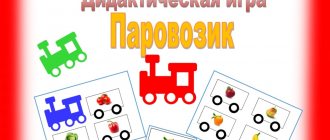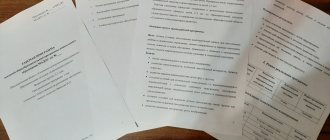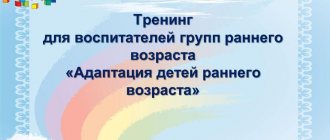Directions of psychological diagnostics
- Screening examination (monitoring) to analyze the dynamics of mental development, identifying people in need of psychological help.
- Identification of the level of readiness or adaptation of children and students to new educational conditions.
- Identification of features and possible causes of maladaptation in order to determine directions for providing psychological assistance.
- Studying the interests, inclinations, abilities of children and students, prerequisites for giftedness.
- Diagnostics of the socio-psychological climate of the team.
- Diagnosis of intellectual, personal and emotional-volitional characteristics.
Based on these areas of psychological diagnostics, the educational psychologist selects methods and techniques that he will use in his work with children. You can find a list of some techniques below.
Diagnostics of adaptation to preschool education
Monitoring a child during the adaptation period is an important diagnostic direction in the work of a psychologist. It allows you to collect data about the child and draw a conclusion about the degree of adaptation to kindergarten. There are many techniques with which you can carry out this observation. I suggest you get acquainted with the list of some of them.
- Ronzhina A.S. “Diagnostics of the level of adaptation of a child to a preschool institution.”
- Methodology of A. Ostroukhova “Studying the degree of adaptation of a child at a preschool educational institution.”
- Methodology of Vatutina N. D. “Determination of the degree of adaptation to preschool educational institutions.”
Diagnostics of cognitive processes
Now there are many different diagnostic kits, which have already selected all the necessary methods for diagnosing cognitive processes in children of different ages. All you have to do is choose which one you like best. Below I have provided a list of the most popular ones.
- Rudenko L.G., Pavlova N.N. Express diagnostics in kindergarten: a set of materials for educational psychologists in preschool educational institutions.
- Rudenko L.G., Pavlova N.N. Psychological diagnostics and correction at an early age.
- Strebeleva E.A. Psychological and pedagogical diagnostics of the development of children of early and preschool age.
- Kurazheva N.Yu., Kozlova I.A., Tuzaeva A.S. Diagnostic complex “Tsvetik-Semitsvetik” for children 3-7 years old.
- Zabramnaya S.D., Borovik O.V. Practical material for psychological and pedagogical examination of children
Forms of organizing the work of a teacher-psychologist
Forms of work of a teacher-psychologist
The complex and multifaceted process of education is carried out using various forms. Their choice depends on the content of educational work, the individual characteristics and age of students, the skill of educators, the characteristics of the class and other conditions in which the educational process takes place.
The form of organization of education is a broad and capacious concept. It is used to denote real processes associated with the organization of educational activities. The concept of “form” (from the Latin forma - external appearance, external outline) means a method of organization and a method of implementation, expression of the content of an object, process, phenomenon.
The concept of form of organization of education is used in a broad and narrow sense. Taking this into account, one should approach the classification of forms of organization of education. In a broad sense, the forms of organization of education characterize the organization of education as a whole, and not individual educational activities. In this understanding, it is legitimate to talk about education in the learning process
as one of the forms of organization of education,
about extracurricular and out-of-school educational work and about family education
as important forms of organization of education.
With this classification of forms of organizing educational activities, we mean not individual, one-time events, but the entire process of education. There are attempts to classify the forms of organization of educational activities depending on the methods of education.
With this classification, forms of education are divided into the following groups:
1) verbal forms (meetings, lectures, reports, conferences, debates, meetings, oral journals, conversations, etc.);
2) practical (hikes, excursions, competitions, club classes, etc.);
3) visual forms (art exhibitions, book exhibitions, thematic stands, etc.).
This classification refers, first of all, to carrying out one-time educational activities. There are attempts to classify forms of education depending on the organization and methodology of the educational process.
This classification includes:
1) forms of organization and management of the life and activities of the children's team (meetings, duty);
2) information and mass forms (meetings, conversations, theme evenings, reports);
3) effective and practical forms (expeditions, hikes, excursions);
4) synthetic forms, school clubs, “lights”, viewing and discussion of films);
5) forms of individual work (consultations, conversations, fulfillment of tasks and instructions).
There are both universal forms - lectures, competitions, evenings, holidays, etc., and special ones that have a specific focus - aesthetic, labor, moral, etc. forms. character (T. A. Ilyina); for example, forms of labor and economic education: conversations, political information, theme evenings on problems of national economic development, conferences, design of wall newspapers and albums, labor landings, meetings and conversations with interesting people, excursions to enterprises, etc.; forms of environmental education: competitions for nature experts, making crafts from natural materials, conversations, environmental landings, etc.; forms of musical education: excursions, music quizzes, evenings, matinees, concerts, song festivals, learning songs, musical games, music clubs, etc.
We can distinguish “subject” forms of educational work: subject weeks (Russian Language Week, etc.); subject games, competitions, quizzes, evenings (“Pushkin Evening”, “Clever Men and Wise Girls”, “Star Hour”, an entertaining hour of biology, etc.). Special pedagogical literature traditionally proposes a classification of organizational forms of education depending on how students are organized: whether the whole class, individual students, or small groups of students participate in the educational process.
Taking this into account, the following forms are revealed:
1) mass, or frontal work;
2) group work (with a constant or changing composition of students);
3) individual work.
An individual form of educational organization is used in the following cases:
- when a pupil has severe and multiple developmental disorders and in training and education, an individual approach is recommended for him, since the person is not capable of training and education in conditions of group and collective work. Due to the peculiarities of his cognitive activity, teaching and raising a child requires continuous individual psychological and pedagogical support and step-by-step control, multiple repetitions. In this way, education is organized for children with severe forms of mental retardation and related disorders;
- when, in accordance with the specifics of the educational process, the characteristics of developmental disorders, and age characteristics, the child needs individual psychological, pedagogical, speech therapy and other correctional assistance, which can complement frontal classes. Here, all the subtleties and deep originality of the development of impaired functions, systems, the level of individual achievements and individual opportunities for the advancement of a particular child are taken into account.
- if the child is studying at home.
Group forms
educational organizations in a special (correctional) school of the VIII type are used as a continuation of individual education, when some correctional and pedagogical effect is achieved in individual classes. Group forms contribute to the activation of children’s activities, their fuller involvement in the educational process, the practical development of collective activity skills and social behavior skills, the activation of speech, mental and communicative activity in conditions of natural, situational motivation for communication, cognition, and interpersonal interaction. Group forms allow for mutual learning of children, develop independence, initiative, responsibility, a sense of camaraderie, partnership, and readiness for mutual assistance.
Group forms of organizing the educational process in a special (correctional) school of the VIII type include circle and club work, occasional events (excursions, Olympiads, competitions, shows, contests, quizzes, theme evenings, hikes and expeditions).
A club association differs from other group forms in the following ways: duration of contact between members of the association (stability of composition); joint activities of participants; voluntary self-determination of participants; active participation of members of the association in its work. Participants in a club association in a special (correctional) school of type VIII are most often high school students (for example, the “Communication” teenage club). It is recommended to hold club meetings once a week in the afternoon, using a variety of business, role-playing and educational games, conversations, psychological and pedagogical diagnostics, psychological and socio-pedagogical trainings and exercises, artistic and creative exercises, etc.
Administration, active teachers, students of other schools, lawyers, employees of educational authorities, etc. are involved in conducting classes. All types of club activities contain important elements and means of educating the school team as a whole and each participant individually, and can provide conditions for creating a real basis for implementation of a number of consistent measures to create a genuine environment conducive to the formation of interpersonal relationships among students with intellectual disabilities. In the club association, conditions are created for the child to increase his status in the eyes of peers, teachers, parents, and to increase his own self-esteem. Based on their form and structure, they distinguish between amateur clubs and hobby clubs. In the extracurricular activities of special (correctional) schools of type VIII, review and thematic quizzes are often used as a means of stimulating the cognitive interest of students.
When preparing and conducting quizzes, it is recommended to adhere to the following rules:
— topics must be relevant;
— questions must be clear and understandable to students;
— questions must be designed for a certain age of students;
— students should have time to prepare an answer;
— there must be winners in quizzes;
— quiz questions should be collected and used in the educational process of the educational institution.
You can suggest the following quiz topics :
- Holiday dates.
- Nature is all around us.
- The world of fairy tales.
- Birds, fish, animals.
- Rivers and lakes.
- Films and cartoons.
- Health.
- About music.
- States and peoples.
- Paintings and artists.
An excursion is a collective trip, a visit to an object for educational, cognitive and educational purposes, which contributes to the formation of students’ worldview, moral and ethical culture, develops observation, influences the formation of a person’s views, tastes, and habits.
The following requirements apply to organizing and conducting excursions in a special (correctional) school of type VIII:
— students need to be prepared for the excursion;
— the excursion should take into account the age and individual characteristics of students;
— the excursion should be related to the educational interests of students;
— the results of the excursion should be analyzed.
Approximate topics of excursions:
- Memorable places in the city that we pass by every day.
- History of the temples of my city.
- People who made history.
- The museum invites you to visit.
- The professions of our parents.
- The world of plants of my land.
Diagnostics of personal and emotional-volitional characteristics
- Methodology “Emotional faces” (N.Ya. Semago) (Goal: assessing the possibility of adequate recognition of the emotional state, the accuracy and quality of this recognition.)
- Anxiety test (Temml R., Dorki M., Amen V.) (Purpose: determining the level of anxiety).
- Test for identifying children's fears A.I. Zakharov and M. Panfilova “Fears in houses” (Goal: identifying and clarifying the prevailing types of fears in children over 3 years old).
- Eight-color Luscher test (Purpose: study of the child’s emotional state).
- “Ladder” technique. Modified by S.G. Yakobson, V.G. Shchur. (Purpose: self-esteem research).
- “Locomotive” technique (S.V. Velieva) (Goal: determining the characteristics of the child’s emotional state).
- Methods for studying children's self-awareness (N.L. Belopolskaya) (Purpose: to study the level of formation of those aspects of self-awareness that are associated with the identification of gender and age).
- Graphic technique M.A. Panfilova “Cactus” (Goal: identifying the state of the child’s emotional sphere, identifying the presence of aggression, its direction and intensity).
- Methodology “Magic Land of Feelings” (Purpose: study of the psycho-emotional state of the child).
- Makhortova G.Kh. Projective methodology for personality research “Tell a story.” (Purpose: personality research).
Developmental and preventive program for the work of a teacher-psychologist with children in kindergarten
Personal readiness.
Includes the formation of a child’s readiness to accept a new social position - the position of a schoolchild who has a range of rights and responsibilities. This readiness is expressed in the child’s attitude towards school, educational activities, teachers, and himself. Personal readiness also includes a certain level of development of the motivational sphere. A child who is ready for school is one who is attracted to school not by its external aspects (the attributes of school life - a briefcase, textbooks, notebooks), but by the opportunity to acquire new knowledge, which involves the development of cognitive interests. The future schoolchild needs to voluntarily control his behavior and cognitive activity, which becomes possible with the formation of a hierarchical system of motives. Thus, the child must have developed learning motivation. Personal readiness also presupposes a certain level of development of the child’s emotional sphere. By the beginning of school, the child should have achieved relatively good emotional stability, against the background of which the development and course of educational activities is possible.
Intellectual readiness.
This component of readiness presupposes that the child has an outlook and a stock of specific knowledge. The child must have a holistic perception, elements of a theoretical attitude to the material being studied, generalized forms of thinking and basic logical operations, and semantic memorization. However, basically, the child’s thinking remains figurative, based on real actions with objects and their substitutes. Intellectual readiness also presupposes the development in a child of initial skills in the field of educational activity, in particular, the ability to identify an educational task and turn it into an independent goal of activity. To summarize, we can say that the development of intellectual readiness for learning at school involves:
differentiated perception;
analytical thinking (the ability to comprehend the main features and connections between phenomena, the ability to reproduce a pattern);
rational approach to reality (weakening the role of fantasy);
logical memorization;
interest in knowledge and the process of obtaining it through additional efforts;
mastery of spoken language by ear and the ability to understand and use symbols;
development of fine hand movements and hand-eye coordination.
Social and psychological readiness.
This component of readiness involves developing in children the qualities that enable them to interact with other children and teachers. A child comes to school, a class where children are engaged in a common task, and he needs to have fairly flexible ways of establishing relationships with other people, the ability to enter the children's society, act together with others, the ability to give in and defend himself. Thus, this component presupposes the development in children of the need to communicate with others, the ability to obey the interests and customs of the children's group.
Diagnosis of parent-child relationships
In the standard “Teacher-psychologist (psychologist in the field of education)” such an area as diagnosing child-parent relationships is not highlighted, but I felt that it needed to be voiced. After all, we must work with the child in conjunction with all participants in educational relations. Therefore, it is very important for us to understand what kind of relationships a child has in his family and how this can affect his behavior and development.
- Projective technique “Family Drawing”. This technique is aimed at diagnosing emotional well-being and the structure of family relationships.
- Test “Diagnostics of emotional relationships in the family” Authors E. Bene and D. Anthony (under the general editorship of A.G. Leaders and I.V. Anisimova). This test is aimed at studying the emotional relationships of a child in the family.
- Rene Gel's projective technique. Research into the sphere of a child’s interpersonal relationships and his perception of intrafamily relationships
- Children's Apperception Test (CAT) (Authors: Leopold and Sonya Bellak)
Main activities of a teacher-psychologist
Under psychological education
refers to the familiarization of adults (educators, parents) and children with psychological knowledge. Psychological knowledge is not sufficiently widespread in society; a psychological culture that presupposes interest in another person, respect for the characteristics of his personality, the ability and desire to understand his own relationships, experiences, and actions is not always expressed. In teaching teams, as well as in families, conflicts are possible, based on the psychological deafness of adults, the inability and unwillingness to listen to each other, understand, forgive, give in, etc. Therefore, it is important for a practical psychologist to increase the level of psychological culture of those people who work with children. The main meaning of psychological education is to familiarize educators and parents with the basic patterns and conditions for the favorable mental development of a child, to popularize and explain the results of psychological research, to create a need for psychological knowledge and a desire to use it in working with a child or in the interests of developing one’s own personality, and also to achieve an understanding of the need for practical psychology and the work of a psychologist in kindergarten and other educational institutions. Psychological education can take place in the form of lectures, conversations, and seminars.
Psychological prevention
- a currently poorly developed type of activity of a practical child psychologist. It is aimed at preserving, strengthening and developing the psychological health of children at all stages of preschool childhood. Unfortunately, this side of the activity of a practical psychologist is not yet developed in our country. But this does not diminish its role. Psychological prevention presupposes responsibility for observing in kindergarten (and other children's institutions) the psychological conditions necessary for the full psychological development and formation of the child's personality at each age stage. Also, psychological prevention involves the timely identification of such characteristics of a child that can lead to certain difficulties, deviations in intellectual and emotional development, in his behavior and relationships. The main difficulty that a psychologist may encounter is the lack of understanding by the teaching staff and parents of the importance of psychological prevention. Such a misunderstanding can be explained by the fact that there are many problems with individual children and groups that urgently need to be addressed and therefore educators and parents may not think about what might happen in the future. A psychologist should try to predict the possibility of problems arising and work towards their prevention. In psychoprophylaxis, the initiative comes entirely from the psychologist, this shows his creativity as a specialist. A psychologist develops and implements developmental programs for children of different ages, taking into account the characteristics of each age stage. It also identifies such psychological characteristics of the child that may subsequently lead to the emergence of certain difficulties or deviations in his intellectual and personal development. A practical psychologist must monitor the observance in kindergarten of the conditions necessary for the normal mental development and formation of the personality of children at each age stage, as well as prevent possible complications in the mental development and formation of the personality of children in connection with their transition to the next age level.
Psychological diagnostics –
psychological and pedagogical study of individual personality characteristics... with the aim of:
- identifying the causes of problems in learning and development;
- determining the strengths of the individual, his reserve capabilities, which can be relied upon during correctional work;
- early identification of professional and educational interests;
- determining the individual style of cognitive activity, etc.
It is carried out in the form of planned diagnostics or diagnostics upon request... of the administration, teachers, parents and is considered as an important preparatory stage of individual and group counseling, psychological and pedagogical consultation, teachers' council...
Psychological diagnostics of professional behavior... is carried out by a psychologist either within the framework of the strategy of his own professional activity developed by him, or upon request... and is carried out in the form of multi-position analysis... based on observations, video filming or other recording...
Advisory work
in kindergarten has a fundamental difference from that carried out by a psychologist in district or other consultations. The specificity of such counseling is that it focuses on solving professional problems. During the consultation process, only what is relevant to solving the main task of the educational psychological service is considered - to maximally promote the mental, personal development of each child. Kindergarten managers, teachers, parents and other people receive advice insofar as they are related to the child. Their problems are considered only in connection with the problems of children, and not in themselves. Educators often turn to a psychologist on the following issues: reasons for children’s difficulties in mastering educational programs (preparing for school), children’s reluctance and inability to study, emotional and personality disorders, conflictual relationships with other children. Parents often come to us with problems: how to prepare children for school, lack of expressed interests in children, poor memory, disorganization, lack of independence, aggressiveness, increased excitability or timidity, timidity; in other words, we mean everything that is usually denoted by the words “difficult child.”







